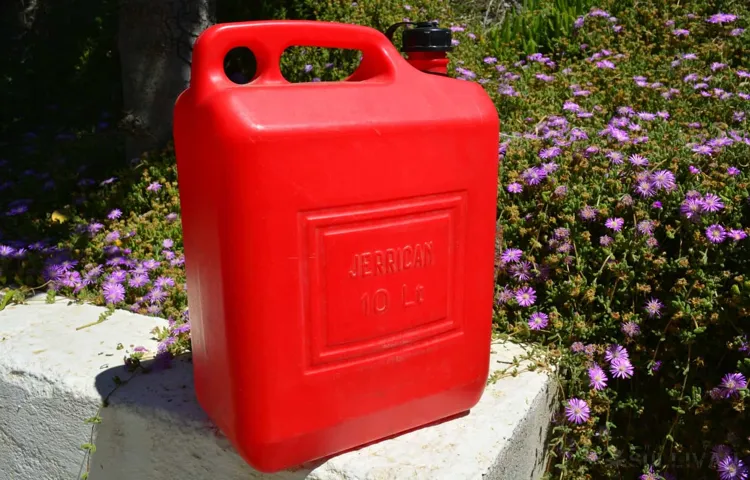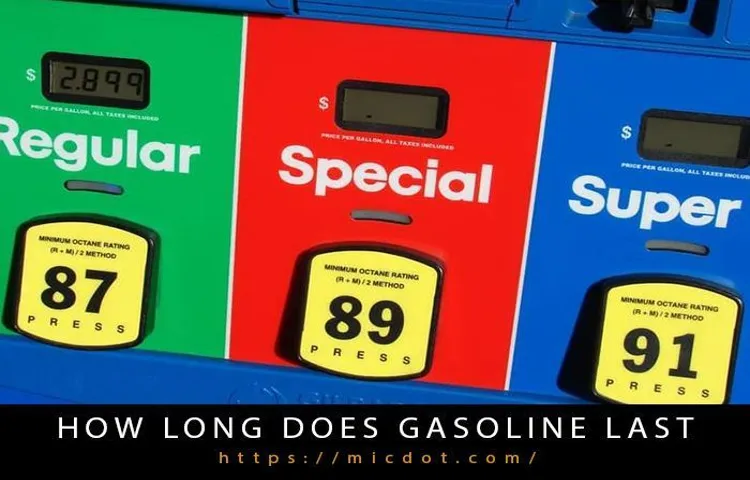Have you ever faced a situation where you stored gasoline for an emergency, only to find it had spoiled and was unusable when you needed it? This can be an incredibly frustrating experience, but there is a solution to this problem. Fuel stabilizers can keep gasoline fresh for an extended period, but the question remains, how long does gasoline last with fuel stabilizer? Fuel stabilizers are additives that help prolong the lifespan of gasoline by preventing oxidation and the formation of varnish and gum deposits. On average, gasoline typically lasts around three to six months, but when you add a fuel stabilizer to the mix, that time can be extended up to two years or more.
It’s important to keep in mind that gasoline with fuel stabilizer will only last as long as the stabilizer’s effectiveness, which varies depending on the brand and product. Some fuel stabilizers may last up to two years, while others may only last a few months. If you decide to use fuel stabilizer to increase the lifespan of your gasoline, it’s crucial to follow the manufacturer’s instructions carefully.
The correct dosage and application of the fuel stabilizer will ensure maximum effectiveness and prevent the gasoline from spoiling prematurely. In conclusion, the lifespan of gasoline with fuel stabilizer depends on multiple factors, including the type of fuel stabilizer used and how well it’s applied. But with proper usage and storage conditions, fuel stabilizers can help prolong the gasoline’s lifespan significantly, making it a useful investment for anyone looking to store fuel for emergency situations.
Table of Contents
Understanding Fuel Stabilizer
If you’re wondering how long gasoline lasts with fuel stabilizer, the answer depends on multiple factors. Fuel stabilizers are designed to prolong the shelf life of gasoline, diesel, and other fuels. Generally, they can help keep gasoline fresh for up to 12 months, and diesel for up to two years.
Factors that can affect fuel stability include storage conditions, type of stabilizer, and the age and quality of the fuel. The most effective way to extend the life of fuel is to store it in an airtight container in a cool, dry place away from direct sunlight and heat sources. It’s also essential to use the proper amount of stabilizer, as more is not always better.
Using too much stabilizer may result in a gummy residue that can clog fuel filters or carburetors. Overall, using fuel stabilizer can be a great way to lengthen the shelf life of gasoline and avoid costly engine repairs caused by stale fuel.
What is Fuel Stabilizer?
Fuel stabilizer. When it comes to storing fuel, one of the biggest challenges is preventing it from going bad. Fuel can go bad due to a variety of reasons, including oxidation and moisture buildup.
This is where fuel stabilizer comes in – it’s a specially-formulated product that helps keep fuel fresh and usable for longer periods of time. Fuel stabilizer works by preventing oxidation and other chemical reactions that cause fuel to break down. It also helps keep moisture from building up, which can cause rust and other damage to fuel systems.
By adding fuel stabilizer to your gas tank, you can ensure that your fuel stays fresh for longer, even when it’s sitting unused for extended periods of time. Overall, fuel stabilizer is a great investment for anyone who needs to store fuel for any length of time.

How Does Fuel Stabilizer Work?
When you store fuel for an extended period, the fuel deteriorates, which leads to engine problems. This is where fuel stabilizer comes in. It acts as a preservative that prevents fuel from breaking down, keeping it fresh and usable for more extended periods.
Fuel stabilizers work by interrupting the chemical reaction that occurs when fuel reacts with air, water, and metal surfaces. The stabilizer contains ingredients that form a protective barrier around the fuel, preventing the fuel from reacting with its surroundings. By adding a fuel stabilizer to your fuel tank, you protect your engine and save money by ensuring that your fuel remains in excellent condition for longer.
You can use fuel stabilizers in gas-powered cars, boats, snowmobiles, and any other vehicle that requires fuel. Therefore, it is essential to consider using a fuel stabilizer to keep your fuel fresh and your engine working optimally.
Effects of Fuel Stabilizer on Gasoline
Have you ever wondered how long does gasoline last with fuel stabilizer? Well, the answer to that question depends on various factors like the quality of the gasoline, the type of stabilizer used, the storage conditions, and the age of gasoline. Fuel stabilizers are chemical additives that are designed to prevent gasoline from breaking down and losing its potency over time. Generally, gasoline with fuel stabilizer can last up to 12 months or even longer under ideal storage conditions, such as in a clean and dry container in a cool and dark place.
However, it is recommended to check the expiration date of the fuel stabilizer before using it, as the effectiveness of stabilizers decreases significantly after a certain period. In addition, it is advisable to shake the storage container to ensure that the additive is fully mixed with gasoline. Whether you are storing gasoline for your car, boat, or other gas-powered equipment, using a fuel stabilizer can prolong its shelf life and save you money in the long run.
Prevention of Gasoline Degradation
Fuel stabilizers are additives designed to prevent gasoline degradation and prolong its shelf life. These additives work by slowing down the oxidation process that occurs when gasoline is exposed to air and moisture, which can lead to the formation of gums and varnishes that can clog fuel lines and carburetors. The effects of fuel stabilizers on gasoline are significant, as they help to maintain the quality and performance of the fuel, especially when it is stored for an extended period.
Fuel stabilizers also help to prevent the buildup of deposits and corrosion inside the fuel system, reducing the risk of engine damage and improving fuel efficiency over time. By using a fuel stabilizer, you can ensure that your gasoline will remain fresh and effective, whether you are storing it for the winter or using it regularly throughout the year. So, if you want to protect your fuel system and keep your engine running smoothly, be sure to add a high-quality fuel stabilizer to your gasoline today!
Maintain Fuel Quality
Maintaining fuel quality is essential to ensure the smooth operation of gasoline-powered vehicles and equipment. Fuel stabilizer is a common additive used to keep gasoline fresh and prevent it from breaking down over time. The effects of fuel stabilizer on gasoline include keeping the fuel from deteriorating, preventing oxidation and corrosion, and stabilizing volatile compounds to maintain octane levels.
This helps ensure the fuel remains effective and prevents issues such as clogs in the fuel system, misfires, and reduced engine performance. Additionally, using fuel stabilizer can help prevent costly repairs and increase the lifespan of gasoline-powered equipment. Overall, fuel stabilizer is a valuable tool for maintaining fuel quality and ensuring the reliable operation of gasoline-powered vehicles and equipment.
Extend Gasoline Shelf Life
If you’re someone who doesn’t use their car or equipment consistently, it’s natural to worry about the shelf life of your gasoline. Fortunately, adding a fuel stabilizer to your vehicle or gas can help increase the lifespan of your gasoline. A fuel stabilizer works through chemical reactions, creating a barrier that prevents oxidation and evaporation from taking place.
The result is a more efficient and longer-lasting fuel, which not only saves you money but also reduces the amount of maintenance work needed on your engine. Keep in mind, a fuel stabilizer isn’t an indefinite solution, and thus, it’s still essential to use your fuel within a reasonable amount of time. But if you’re looking for a little extra insurance, adding fuel stabilizer to your gasoline is an excellent option that guarantees a longer shelf life.
Shelf Life of Gasoline with Fuel Stabilizer
Many people wonder how long gasoline lasts with fuel stabilizer added to it. The shelf life of gasoline with fuel stabilizer can vary depending on a few factors, such as the type of stabilizer used and the conditions under which the gasoline is stored. However, on average, gasoline with fuel stabilizer can last up to two years or even longer without losing its potency.
Fuel stabilizers work by preventing the oxidation and breakdown of gasoline, which in turn helps maintain its quality and prevents it from becoming stale. It’s essential to follow the manufacturer’s instructions when using fuel stabilizer to ensure optimal results. Keep in mind that gasoline can still degrade over time, even with a stabilizer added, so it’s crucial to use it within a reasonable time frame.
With the right conditions and proper storage procedures, gasoline with fuel stabilizer can last a while and save you from having to replace it frequently.
Factors That Affect Shelf Life
Gasoline with Fuel Stabilizer When it comes to gasoline, shelf life is a crucial factor that affects its quality and usability. The shelf life of gasoline can vary depending on a range of factors, including temperature, air exposure, and the addition of fuel stabilizers. Fuel stabilizers are chemicals that are added to gasoline to extend its shelf life and prevent oxidation, which can lead to the formation of harmful varnish and sludge.
Using gasoline with a fuel stabilizer can help to ensure that your fuel remains fresh and usable for an extended period, which is particularly important if you need to store your fuel for any length of time. While fuel stabilizers are not a magic solution that can keep gasoline fresh indefinitely, they can certainly help to extend its lifespan and keep it in good condition for longer. So, if you’re looking to store gasoline for any length of time, it’s definitely worth considering using a fuel stabilizer to help ensure that your fuel remains fresh and usable when you need it.
Typical Shelf Life of Treated Gasoline
Gasoline Shelf Life Gasoline can begin to degrade over time due to the evaporation of lighter components that occurs naturally. Treated gasoline can last much longer, with a typical shelf life of 6 to 12 months if stored correctly. However, adding fuel stabilizer to the gasoline can extend the shelf life up to two years or more.
This is because fuel stabilizers act as antioxidants to prevent the oxidation process that causes gasoline to degrade. In addition to extending the shelf life, fuel stabilizers can also protect the engine from deposits and prevent corrosion by forming a protective layer on the fuel system. The shelf life of gasoline with fuel stabilizer can depend on the quality of the fuel, the storage conditions, and the amount of stabilizer used.
It is important to always follow the manufacturer’s instructions for the amount of stabilizer to use and to store the gasoline in a cool, dry place. Overall, using fuel stabilizer can greatly increase the shelf life of gasoline and protect both the fuel system and engine.
Conclusion
In the battle against the clock that threatens to turn gasoline into a useless, gummy mess, fuel stabilizer emerges as the trusty sidekick that keeps Gotham safe (and the gas tank full). With a dash of stabilizer, you can extend the life of your gasoline for months and even years, giving you the peace of mind that comes with knowing your fuel is ready to go whenever you are. So, while time may march on, your gasoline can keep on humming along, thanks to the power of fuel stabilizer.
“
FAQs
Is fuel stabilizer always necessary for storing gasoline?
No, fuel stabilizer is not always necessary for storing gasoline. However, it can significantly extend the lifespan of gasoline if it is going to be stored for an extended period.
Can I use any type of fuel stabilizer?
No, it’s important to use a fuel stabilizer that is compatible with the type of gasoline you are using. Check the label or consult with a professional to ensure you are using the correct stabilizer for your fuel.
How long does gasoline last with fuel stabilizer?
Gasoline can last up to 1-2 years with fuel stabilizer, depending on the quality of the fuel and the conditions in which it is stored.
Can fuel stabilizer prevent water from getting into the gasoline?
Yes, some fuel stabilizers are formulated to prevent water absorption, which can prevent damage to the fuel system.
Can fuel stabilizer prevent gasoline from evaporating?
Yes, some fuel stabilizers contain additives that prevent gasoline from evaporating, which can help to maintain the fuel’s quality over an extended period.
Can fuel stabilizer restore old gasoline?
No, fuel stabilizers cannot restore old gasoline that has already degraded. However, they can protect still-usable gasoline from degrading over time.
How much fuel stabilizer should I use?
The amount of fuel stabilizer you should use depends on the size of your fuel tank and the type of stabilizer you are using. Consult with the product label or a professional for specific instructions.


